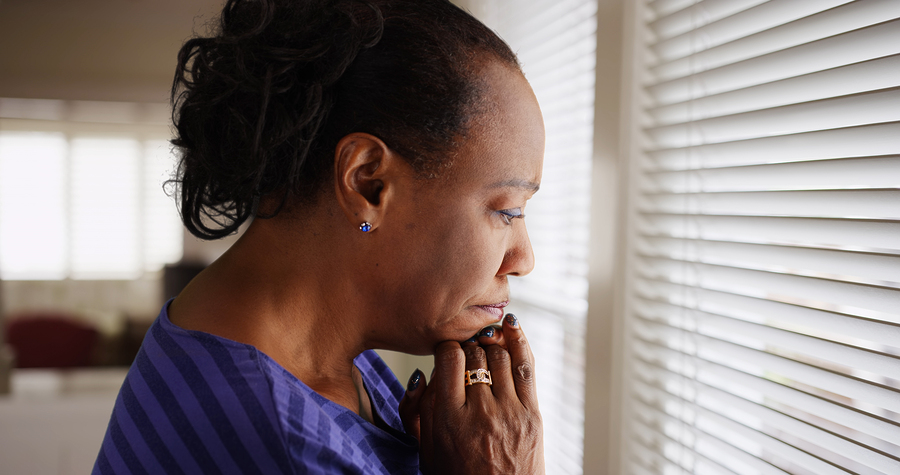Could My Loved One Have an Anxiety Disorder?
 Certainly, there are things to fret about as we grow older. We may face health challenges. We may have financial concerns. We may fear falling. We may worry about family members or the state of the world. It is part of human nature to be anxious sometimes.
Certainly, there are things to fret about as we grow older. We may face health challenges. We may have financial concerns. We may fear falling. We may worry about family members or the state of the world. It is part of human nature to be anxious sometimes.
But it’s a myth that anxiety increases with age. In research published by Liberty Mutual Insurance, psychologists noted, “Unlike the stereotypical depictions of older adults fretting, worry actually significantly diminishes as we age. Studies consistently find that older adults worry less than younger ones … in fact, older adults taking a retrospective look on their life frequently say their biggest regret is that they spent so much time worrying.”
Nonetheless, for some seniors, anxiety can be debilitating—certainly more than some of the things they are worrying about. If a senior is experiencing uncontrollable worries, they may be suffering from an anxiety disorder.
Experts estimate that perhaps one in ten seniors experiences enough anxiety to harm their quality of life and their health. Anxiety can cause nausea, dizziness and sleep problems. People with anxiety report higher levels of pain. Anxiety raises the risk of a host of physical health problems. And University of Southern California researchers recently showed that people with chronic anxiety have a 48 percent higher risk of dementia!
If a senior loved one is showing signs of excess anxiety, seek an evaluation from a doctor who is familiar with senior mental health issues. Diagnosis is the first step. Seniors may experience several types of anxiety disorders:
- Generalized anxiety disorder, the most common type among older adults, in which a senior seems to fret all the time with no particular reason to do so
- Panic disorders, which cause sudden, intense attacks of fear, with a seemingly minor trigger or no discernable cause
- Social anxiety disorder, in which a person is afraid of being embarrassed or judged by others, often avoiding the company of others
- Post-traumatic stress disorder (PTSD), which is a delayed reaction to a traumatic event in the past
Anxiety can be treated. For seniors, treatment might include:
Diagnosing and managing underlying health conditions
Certain conditions can make us feel more anxious—in fact, anxiety might be the first symptom of heart trouble, diabetes or digestive problems. Some medications also can cause anxiety, so a medication review should be an early step.
Cognitive/behavioral therapy
“Talk therapy” from a trained professional helps patients understand what’s causing their anxiety, and learn skills to help cope with their fears. Often, treatment focuses on learning to cope with uncertainty in life. Mindfulness practices, such as yoga or tai chi, may help calm our worried thoughts. The Liberty Mutual experts suggest strategies such as writing down your fears, “scheduling” time for worrying, and making lists of practical plans to address our concerns.
Exercise
Experts say that inactivity can markedly increase feelings of anxiety. Get off the couch and into an exercise class. Look for ways to add a bit of movement to your life throughout the day. For senior patients with the not-uncommon fear of falling, a fall protection class can provide confidence.
Increased socialization
We are a very social species, and loneliness raises our anxiety level. It helps to know we’re not alone. Group therapy and support groups are a great way to connect with others who are dealing with the same feelings. Volunteering is another way to take our minds off our own concerns and enhance our sense of purpose in the world.
Medications
Geriatricians caution that while medication should not be the automatic first treatment option for a senior with anxiety, and that some drugs are inappropriate for older patients, several types of medications can be helpful. It’s important to take these medications correctly and to report side effects such as confusion, dizziness or drowsiness.
A combination of these treatments often yields the best results. Finding the best regimen may take some time and patience, but it’s well worth it to return a senior’s sense of peace and joy of living.
The Oscar and Ella Wilf Campus for Senior Living is comprised of Stein Assisted Living, Jaffa Gate Memory Care Neighborhood, Stein Hospice, Wilentz Senior Residence, Wilf Transport, and The Foundation at the Wilf Campus. For more information, contact us at (732) 568-1155, [email protected] or visit us at www.wilfcampus.org.

